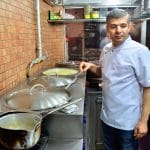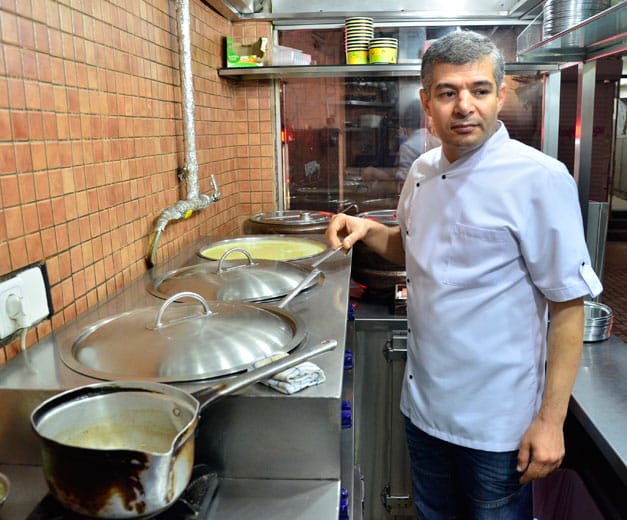Around this time of year, the smell of dough frying fills the air on a side street off Marseille’s busy Rue de Rome. The source of the enticing scent is Patisserie Avyel, a small kosher bakery and salon de thé in the midst of preparing for Hanukkah, which in 2020 begins on the evening of December 10.
For Hanukkah, the Festival of Lights, Jews often make fried treats to commemorate the miraculous oil that kept a lamp burning for eight days instead of one in the rededicated Temple in Jerusalem some 2,200 years ago. Latkes – potato pancakes – might be the best-known Hanukkah food, but frying up dough is another popular tradition, with these holiday “doughnuts” varying by geography. The Sephardim from North Africa sizzle up the circular sfenj while in Israel the tradition is to eat sufganiyot, the Hebrew name for round yeasted doughnuts filled with jelly.

In Marseille – home to the third largest Jewish community in Europe after London and Paris – the best Hanukkah fried treats can be found at Patisserie Avyel. The doughnuts here are a hybrid, an edible testament to the Jewish diaspora. Though owner Joseph Sultan comes from Morocco, his bakery has a French zip code, so he bakes a classic beignet similar to those found in French boulangeries.
Generously dusted with granulated sugar and made with eggs, milk, yeast and flour, the beignets are like unstuffed sufganiyot. Unfettered by a fruity filling, the orbs are wonderfully pillowy. Their sugar coating melts in your mouth and covers your fingers – it’s impossible not to lick them. When dunked in coffee, the beignets are simply divine.
You can buy the beignets around the Hanukkah season – starting a week or so before and lingering afterwards, to stretch out the holiday cheer. For Purim, around March, Patisserie Avyel tilts toward Joseph’s Moroccan roots, with makrout (date-filled almond cakes), cigares (crunchy honey, almond and phyllo-dough rolls) and other pâtisseries orientales.

To celebrate Shabbat, every Friday the bakery is perfumed with the scent of fresh-baked challah. Like brioche sans butter, the golden-brown braided loaves have a yolk-rich yellowy dough – they get their glossy finish from an egg wash. When we remark at their bargain €2 price, Joseph winks, “Le cacher c’est pas cher.” (“Eating Kosher is not expensive.”)
Joseph winks, “Le cacher c’est pas cher.” (“Eating Kosher is not expensive.”)
The rest of the year, the menu at Patisserie Avyel leans traditionally French. In the morning, retired yarmulke-topped men and parents who dropped their kids at the nearby private Jewish school pair their café with croissants, brioche and pain au chocolat. Kids and locals swing by for an afternoon goûter (snack), from the sweet – palmiers (puff pastry cookies) or millefeuille (layered cream treats) – to a handful of savory items: a tuna and tomato topped pizza, bite-sized salmon sandwiches, and other amuses-gueules (mouth-pleasers). On Fridays, the patisserie often serves up fricassée, the Tunisian sandwich stuffed with tuna, hard-boiled egg and tomato.
As hinted by the Chabad donation can at the cash register and the mirror behind the pastry case shaped in the form of the Ten Commandments, everything at Patisserie Avyel is strictly kosher. In fact, most of the establishments are cacher along this chunk of the Rue Saint-Suffren, hence it’s nickname as the Rue des Juifs (“Road of the Jews”). “I was the instigator,” Joseph says proudly, explaining how the storefronts were empty when he arrived in 1991. He came from Tangiers, tracing the path of his fellow Moroccan Jews relocating to France and Israel.

Recognizing the potential of having a kosher business on the same block as a private Jewish school, he began with a supérette (mini-mart) a few doors down, and then relocated to number 28 to launch the bakery. His pert wife, Monique, helps out on busy days. Son Isaac followed in his father’s entrepreneurial footsteps, opening at number 25 what is now the kebab and burger joint Shwarma City. A big supermarket, Jewish bookstore and other kosher restaurants round out the road that Joseph jump-started.
While the street, and Marseille, has evolved, Patisserie Avyel still feels like an old-school joint. Regulars read the local rag, La Provence, at maroon-and-white Formica tables. Joseph jots cake and catering orders in a notebook (there’s no printed menu or website). Though business has slowed (wallets have tightened due to the global economic crisis) and Joseph is now in his 60s, he still enjoys the day-to-day camaraderie with his clientele. Like joking with a regular that he’ll “photocopy the croissants” when there aren’t enough left to fill her order. Luckily, that’s just a joke – for it’s the fresh-baked goods that make this bakery such a treat.
Editor’s note: To celebrate the start of Hanukkah, we are rerunning this story, which was first published on December 24, 2019.
 March 11, 2014 Bulk Wine
March 11, 2014 Bulk Wine
For so long, bulk wine has been synonymous with plonk – even in a country like Spain, […] Posted in Barcelona December 29, 2014 Murat Kelle Paça
December 29, 2014 Murat Kelle Paça
Editor's note: It's Soup Week at Culinary Backstreets, and to kick things off, our […] Posted in Istanbul June 28, 2018 MinE
June 28, 2018 MinE
The peripheral neighborhoods of Barcelona – untouched by tourism and with cheaper rents […] Posted in Barcelona
Published on December 10, 2020
Related stories
March 11, 2014
BarcelonaFor so long, bulk wine has been synonymous with plonk – even in a country like Spain, where buying wine straight from the barrel was standard practice up until the 1980s, when it was largely replaced by bottles with certified designations of origin. We are well acquainted with the bad stuff, which we call vino…
December 29, 2014
Istanbul | By Joel Zorrilla
IstanbulEditor's note: It's Soup Week at Culinary Backstreets, and to kick things off, our Istanbul correspondent takes us to an eatery in Beyoğlu whose hearty broths refuel late-night revelers and daytime workers alike. Most of Murat Kelle Paça’s clientele stumble in between 1 and 5 o’clock in the morning, after a boisterous night of drinking, concert-going…
Discover the Sants neighborhood on our new walk!
June 28, 2018
BarcelonaThe peripheral neighborhoods of Barcelona – untouched by tourism and with cheaper rents – are a land of opportunity for chefs seeking an affordable place to set up shop. These areas in turn attract gourmet gold seekers in pursuit of a brilliant meal at a friendly price. In the residential streets of Sants, not too…




















































































